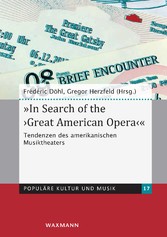Suchen und Finden
Service
Mehr zum Inhalt

"In Search of the 'Great American Opera'" - Tendenzen des amerikanischen Musiktheaters
Buchtitel
1
Inhalt
5
Vorwort
7
Größe als Erhabenheit. Einführende Gedanken zu Bernard Herrmann (Gregor Herzfeld)
9
Das Paradigma „Moby-Dick“
9
Erhabene Musik in Bernard Herrmanns „Moby-Dick“ (1938)
10
Herrmanns „Wuthering Heights“ (1951) als „Great American Opera“
13
Literatur
17
Crafting the Soundworld of American Opera, 1910–1912 (Aaron Ziegel)
19
Introduction
19
Early background
21
Components of an American idiom
24
The perpetual state of »not yet«
39
Appendix: Premiere Production Details
41
Published Scores and Librettos
43
References
43
„Recognizably American“. Aaron Coplands „The Second Hurricane“ (1936/37) als musikalische Theatralisierung des Politischen im „New Deal“ (Marcus Gräser)
45
Operatic Conventions on Broadway, 1935–1960 (Christopher Lynch)
65
»Seriousness« in the Musical Comedy
69
Ensembles
72
Recitative
74
The Fate of Operatic Conventions on Broadway
77
References
78
Toward an American Folk Opera. Performing Primitivism and Negro Folk Culture in Hall Johnson’s „Run, Little Chillun!“ (1933) (Micah Wittmer)
81
Portraying Africanisms in Negro Folk Culture
83
Portraying the Black Church of Negro Folk Culture
90
Conclusion
97
References
98
Oper als Strategie der kompositorischen Selbstinszenierung und Wertbegriff: „Street Scene“ (1946) und „West Side Story“ (1957) (Nils Grosch)
101
The Sound of Music (1959) – »A Great American Opera«? (Marie Louise Herzfeld-Schild)
113
Glass avec Fukuyama oder Philip Glass’ „The Voyage“ (1992) und das Ende der Geschichte (Mauro Fosco Bertola)
131
„The End of History“ oder von der (bitteren) Wahrheit des Übertreibens
133
Analogien: Fukuyama at the Opera
136
Glass avec de Maistre: Reisen bis ans Ende der Geschichte
141
Kundrys Schmach, Columbus’ Tod: Reisen als Kreisen
144
Literatur
145
About the Task of Adapting a Movie Classic for the Opera Stage: On André Previn’s „A Streetcar Named Desire“ (1998) and „Brief Encounter“ (2009) (Frédéric Döhl)
147
A Three-Step-Adaptation-Formula
147
All Eyes and Ears on Blanche: On „A Streetcar Named Desire“
161
Longing in Close-up: On „Brief Encounter“
163
An Opera Composer of Desire
167
References
168
Sense and Sensibility: Music on Stage in „What Next“? (John Link)
177
Libby Larsen’s „Barnum’s Bird“. The „Great American Opera“ (Sharon Mirchandani)
199
Introduction
199
Genre
199
Subject, Structure, Origins, and Performance History
200
Dramatic Themes
202
The Music
204
A Hybrid
204
Larsen’s Music and Motives
205
Diagetic Music
210
Two Ensemble Scenes
212
Summary
215
References
215
„The Mysteries of Selma, Alabama“. Re-telling and Remembrance in David Lang’s „The Difficulty of Crossing a Field“ (Amy Bauer)
219
Introduction
219
The First Re-telling: Bierce the Bitter, Quixotic Crusader
220
The Second Re-telling: The Theater of Subversion
222
The Third Re-telling: A Fractal Journey
224
The Fourth Re-telling: A Noble Music
225
The Fifth Re-telling: A Field in Long Beach
230
The Sixth Re-telling: A History of the »Disappeared«
231
The Seventh Re-telling: Go Forth and Multiply
232
References
232
Autorinnen und Autoren / Authors
235
Alle Preise verstehen sich inklusive der gesetzlichen MwSt.








